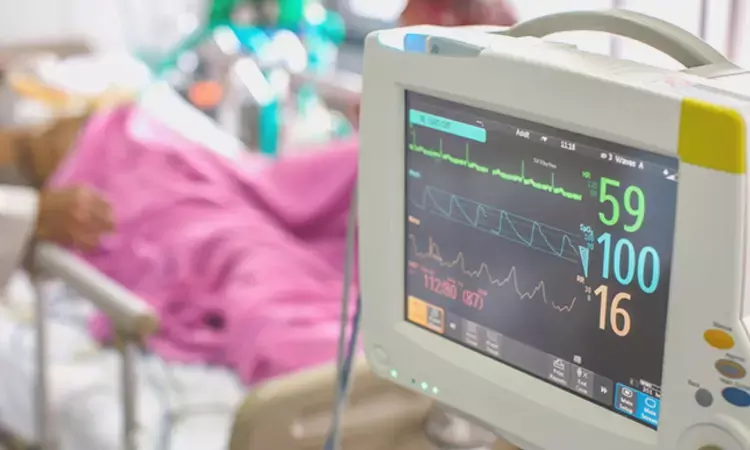- Home
- Medical news & Guidelines
- Anesthesiology
- Cardiology and CTVS
- Critical Care
- Dentistry
- Dermatology
- Diabetes and Endocrinology
- ENT
- Gastroenterology
- Medicine
- Nephrology
- Neurology
- Obstretics-Gynaecology
- Oncology
- Ophthalmology
- Orthopaedics
- Pediatrics-Neonatology
- Psychiatry
- Pulmonology
- Radiology
- Surgery
- Urology
- Laboratory Medicine
- Diet
- Nursing
- Paramedical
- Physiotherapy
- Health news
- Fact Check
- Bone Health Fact Check
- Brain Health Fact Check
- Cancer Related Fact Check
- Child Care Fact Check
- Dental and oral health fact check
- Diabetes and metabolic health fact check
- Diet and Nutrition Fact Check
- Eye and ENT Care Fact Check
- Fitness fact check
- Gut health fact check
- Heart health fact check
- Kidney health fact check
- Medical education fact check
- Men's health fact check
- Respiratory fact check
- Skin and hair care fact check
- Vaccine and Immunization fact check
- Women's health fact check
- AYUSH
- State News
- Andaman and Nicobar Islands
- Andhra Pradesh
- Arunachal Pradesh
- Assam
- Bihar
- Chandigarh
- Chattisgarh
- Dadra and Nagar Haveli
- Daman and Diu
- Delhi
- Goa
- Gujarat
- Haryana
- Himachal Pradesh
- Jammu & Kashmir
- Jharkhand
- Karnataka
- Kerala
- Ladakh
- Lakshadweep
- Madhya Pradesh
- Maharashtra
- Manipur
- Meghalaya
- Mizoram
- Nagaland
- Odisha
- Puducherry
- Punjab
- Rajasthan
- Sikkim
- Tamil Nadu
- Telangana
- Tripura
- Uttar Pradesh
- Uttrakhand
- West Bengal
- Medical Education
- Industry
Vitamin D deficiency tied to increased blood sugar and insulin need among ICU patients

Iran: A recent study published in the European Journal of Translational Myology has shown that decreased vitamin D is linked with increased blood sugar and insulin requirements in ICU patients. Women are shown to be at higher risk for vitamin D deficiency.
In patients admitted to the ICU (intensive care unit), hyperglycemia is common and is linked with harmful effects such as increased ICU stay, infection risk, and death and complications. IV (intravenous) insulin infusion is the preferred method of controlling blood sugar in such patients.
In Iranians, there is a high vitamin D deficiency related to hyperglycemia. Mohammad Niakan Lahiji from Iran University of Medical Sciences in Tehran, Iran, and colleagues, therefore, aimed to assess the association between vitamin D levels and the required insulin dose prescribed based on an insulin therapy protocol in critical condition patients admitted to the intensive care unit in an investigation based in Iran in a cross-sectional study.
The study included patients who required insulin due to hyperglycemia. The team from Iran investigated the relationship between serum vitamin D levels and the needed insulin dose prescribed based on insulin therapy protocol in this patient population.
The authors reported the following findings:
- A total of 172 patients with a mean age of 46.93 ± 31.9 years were included in the study. Across the included participants, 78.8% of patients had vitamin D deficiency, 11.9% had insufficient vitamin D, and 9.3% had normal vitamin D levels.
- There was a significant difference in mean blood sugar between the vitamin D deficiency and standard groups.
- Vitamin D levels were also significantly higher in men than women.
- The HbA1C hemoglobin level in patients with Vitamin D deficiency was significantly higher compared to the group with normal vitamin D levels.
The study showed an inverse relationship between vitamin D levels and the patient's blood sugar levels. Increasing vitamin D levels reduced blood sugar levels and decreased patients' insulin requirements, implying reduced insulin resistance.
"Our findings indicated that low vitamin D levels are associated with increased blood sugar and insulin requirements in patients admitted to ICU. Women are at a higher risk for vitamin D deficiency," the researchers wrote.
"We hope that these findings may help inform relevant treatment strategies," they conclude.
Reference:
Niakan Lahiji, M., Moghaddam, O. M., Ameri, F., Pournajafian, A., & Mirhosseini, F. (2023). Relationship of Vitamin D level with insulin dosage required based on insulin therapy protocol. European Journal of Translational Myology. https://doi.org/10.4081/ejtm.2023.11017
Dr Kamal Kant Kohli-MBBS, DTCD- a chest specialist with more than 30 years of practice and a flair for writing clinical articles, Dr Kamal Kant Kohli joined Medical Dialogues as a Chief Editor of Medical News. Besides writing articles, as an editor, he proofreads and verifies all the medical content published on Medical Dialogues including those coming from journals, studies,medical conferences,guidelines etc. Email: drkohli@medicaldialogues.in. Contact no. 011-43720751


